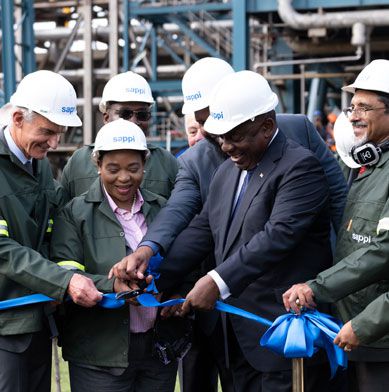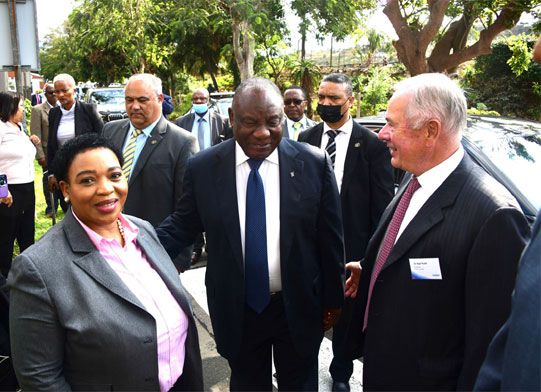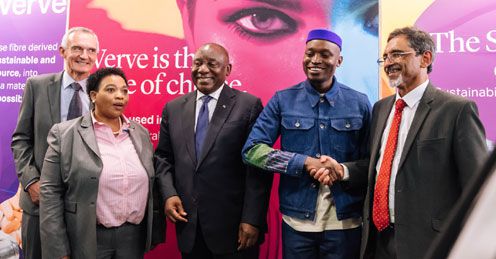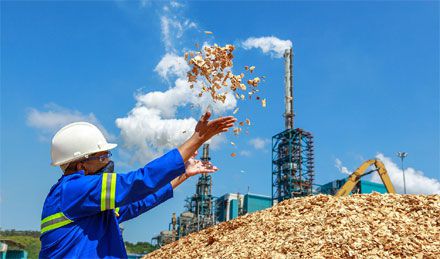Commenting during his keynote address, following the official ribbon-cutting and plaque unveiling, the president said: “Today, we are witnessing far more than a financial investment. We are witnessing an investment in infrastructure, people, innovation, technology and sustainability. It is an investment in community development, in the local economy, in our export capacity and in the industrialisation of our economy.”

L-R: Mr Alex Thiel, Sappi Southern Africa CEO, the Premier of KwaZulu-Natal, Ms Nomusa Dube-Ncube, His Excellency President Cyril Ramaphosa and Mr Ebrahim Patel, Minister of Trade and Industry and Competition during the official ribbon-cutting ceremony at the opening of the project.

Sir Nigel Rudd, chairman of the Sappi Limited board, welcomes His Excellency President Cyril Ramaphosa and the Premier of KwaZulu-Natal, Ms Nomusa Dube-Ncube, to the Sappi Saiccor Mill
During his address the president made the point that Sappi Southern Africa, one of the country’s largest users of container for exports, makes an important contribution to the country’s export revenues, and that while foreign direct investment is important for the economy, the greatest demonstration of confidence is when South African companies take that lead. He went on: “The realisation of Sappi’s investment here at Umkomaas sends the strongest signal that our homegrown multinationals are taking the lead in investing in our economy. It demonstrates confidence to other potential investors that this is indeed a favourable place to invest in and to do business,” he said.
The President congratulated Sappi on staying true to and delivering on the commitment that Sappi Limited chief executive officer, Mr Steve Binnie, made during the inaugural South African Investment Conference held in 2018, when the expansion project was first announced.
Commenting on the investment, Sappi chairperson Sir Nigel Rudd said, “Our investment here at Saiccor provides tangible confirmation in our belief that South Africa has more to offer as an export hub; has great potential to expand its forest products sector especially as a low carbon renewable resource driver of economic growth and social upliftment; and can help guide and lead Africa to develop the continent’s forest products potential.”

The delegation meet up with Tshepo Mohlala, designer extraordinaire – who made up bespoke Tshepo Jeans for the event, made from imported denim containing Sappi’s Verve lyocell blend pulp.

The Saiccor Expansion and Environmental Upgrade project assists Sappi in achieving its ambitious Thrive 25 purpose of moving toward a more circular economy by reducing and replacing the need for fossil-based products by using renewable and sustainable wood to produce innovative biobased products.
The project will not only add 110,000 tons of capacity to the mill’s production of dissolving pulp (DP) to meet the increasing demand from global customers for natural and renewable dissolving pulp, particularly Lyocell pulp, but will also significantly reduce the mill’s environmental footprint and supports Sappi’s decarbonisation journey, whilst also generating an additional R1bn per annum in direct benefit to the KwaZulu-Natal economy.
In addition, Saiccor Mill is busy with the construction of a pilot plant to produce Furfural, a bio-chemical extracted during the processing of timber. Used as a replacement for fossil fuel-based chemicals in agriculture, foodstuffs and industrial processes, this will provide further revenue streams and export opportunities for South Africa and further underpins the country’s move to embracing low-carbon circular economy options.
In her address, the premier of KwaZulu-Natal, Nomusa Dube-Ncube saluted Sappi on being an iconic and patriotic business and expressed gratitude that Sappi was part of the radical socio-economic transformation programme in the province, focused on the localisation of goods and services and the employment of local residents. Commenting on the expansion project she said: “It represents not just a vote of confidence in the people of KwaZulu-Natal as a rising province, but it also has a knock-on effect for other companies to benefit from the emerging opportunities.”
Echoing these sentiments, Ebrahim Patel, Minister of Trade and Industry and Competition, pointed out that the challenge with development was for it to focus on parts of the country and communities that are marginalised and not in the economic mainstream. According to him, the Sappi Saiccor expansion meets this challenge, saying “it’s at the heart of what development is all about. It supports the government’s rural economic development strategy; it connects local communities to global value chains.”
Steve Binnie, CEO of Sappi Limited, illustrated how this was achieved by saying: “We are pleased that this project opens the way for the many forestry value chain participants that benefit as part of the eco-system. Sappi sees itself as an anchor tenant and proud role-player in the rural landscape of our country, leading the way in the multibillion-rand forestry industry and in responsible forestry management with its dual-certified FSC and PEFC plantations. We are thankful that this project helps us to ‘open the way’ to achieve our ambitious Thrive 25 purpose of moving toward a more circular economy by reducing and replacing the need for fossil-based products by using renewable and sustainable wood to produce innovative biobased products. Not only for our own benefit, but for the benefit of our country, its people, and for the planet at large.”
The event - witnessed by invited guests including government dignitaries, traditional leaders, community members, industry and business representatives and Sappi management and staff - was a fitting testament to the hard work that the project team put into this mammoth project over the past four years.